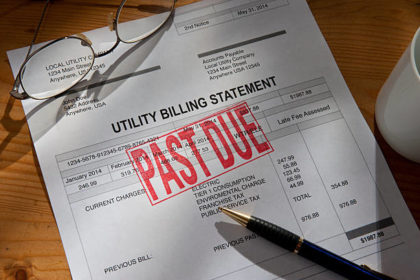
By Chantelle Gladwin-Wood (Partner) and Maike Gohl (Partner)
10 September 2020
INTRODUCTION
There can be nothing more alarming than suddenly receiving a monthly invoice containing municipal charges that far exceed what you had expected or budgeted for. There are three possible reasons why you may have suddenly received an unusually high water bill. The City* may have:
i. overestimated the amounts that you should be charged for, based on estimated readings;
ii. made a billing mistake on the account and it is not correct; or
iii. you have a water leak at the premises.
OVER-ESTIMATED BILL
The City is entitled to charge a consumer for water using estimated (rather than actual) meter readings, for a period not exceeding 180 days. If your invoice indicates that your charges are based on estimated readings, and the charges seem excessive, you can log a query (in the manner described below) to request the municipality to come out to your property, inspect the meters, and take an actual reading of the meter. If you are correct in your suspicion that the municipality has over-estimated your usage, then your bill ought to be adjusted for actual readings after they have been taken and your bill should then decrease in the next statement.
INCORRECT BILL
A water bill can be incorrect for many reasons. The most common reason is that the municipality has not recorded that a change of meters has taken place at the premises, and continues to bill based on estimated charges in relation to a meter that has been removed and replaced by another meter. Another common cause of incorrect billing for water charges stems from the City failing to account for the number of households at the property in multi-dwelling settings. If you are certain or you suspect that your bill is incorrect for any reason, log a query as described below.
The above two problems are just two of many examples of what could be wrong with the billing on your account. If you are certain that there is something wrong with the bill, but you cannot place it, you may need to approach an expert in municipal accounts or assistance.
LOGGING A QUERY
If you are certain or you suspect that your bill is incorrect, or you would like to request that the municipality take actual readings of your meter, log a query with the City’s call centre on (011) 375 5555 or 0860 56 28 74 and ask them to investigate the account or meter, and if necessary to correct the bill. Once you have logged a query, the City is legally bound to investigate your query, to resolve your query, and to notify you of the outcome of your query in writing. This should take place within one to two months. If your query has not been resolved by the time that you receive your next bill, phone and log another query because your prior query might have been closed without resolution. If the City does not resolve the dispute after a reasonable period of time (which the authors would caution is about three months, but may be longer depending on the facts of the case), you may need to approach an attorney for assistance in compelling the City to investigate and resolve your query.
WATER LEAK- WHO IS RESPONSIBLE?
The City owns the water meter and the supply from the street to the water meter. You own the pipes from the water meter into the house. The water leak could be before the meter (in which case it usually won’t cause your bill to increase because the water that is leaking doesn’t run through your meter at all), at the meter (in which case it may or may not cause an increase in your bill because depending on where the leak is, the leaking water may or may not run through your meter), or between the meter and the house or even inside the house (in which case it will most certainly cause your bill to increase because all the leaking water is running through your meter). The City might also be responsible for the water pipe between the meter and the boundary wall of the consumer’s property (although this will depend on where the consumer’s property boundary line actually lies). The City is further responsible for the meter itself. However, the consumer is responsible for any water pipes located within the boundaries of its own property.
It is the City’s responsibility to investigate and stop a leak if it occurs at the meter, because the meter is owned by the City. If you or a plumber try to fix it, this could be seen as tampering, which is a criminal offence. In addition, the City is responsible for any leak that occurs between the meter and the consumer’s boundary of the property (but this will not normally increase your bill, it just depends on where the meter is located). If, however, the meter is located close to the street and there is a pipe that runs from there to your boundary wall and the leak occurs on that pipe, it is still your responsibility as the consumer to repair that leak. Ultimately, it is your responsibility to investigate and stop a leak if it occurs within the boundary of your property.
WHAT TO DO IF YOU SUSPECT THAT YOU HAVE A LEAK
The City’s policy is that if a leak occurs outside the property or is as a result of a faulty meter, then the consumer cannot be liable for the wasted water. If you suspect that you have a water leak at the meter or in the pipes supplying water to the meter, i.e. upstream of the meter, you should immediately contact the City’s call centre and log a query for the City to send technicians to investigate whether there is a leak in the part of the system that falls under the City’s responsibility to maintain. If the leak is located within the boundaries of the property, then the consumer will be liable for the charges. If you suspect that you have a water leak between the meter and your boundary wall, you should immediately contact a plumber or a leak detector to check if you have a leak at the premises. If they have determined that you have a leak at the premises, have them fix it and ask them to provide you with a report detailing the leak, with an emphasis on location, and confirming that the leak was repaired.
CAN I CLAIM A REFUND FOR THE LEAK?
If circumstances are such that you would have become aware of the leak sooner if the City had taken regular and actual readings of the meter – or you tried to obtain your accounts to see how much you needed to pay, but they were not available to you from the City’s call centre or website – then an argument could be made that you as the consumer should not be liable for the charges flowing from the leak. However, this will be dealt with on a case-by-case basis and although it is possible to approach a court to compel the City to write off amounts billed for water in such circumstances, it is not advisable for consumers to rely on the hope that this will happen. This is also ordinarily a costly and lengthy process. It is much more prudent to take every possible measure to avoid being caught with a ‘big bill’ for a leak, than to fight the ‘big bill’ once it arrives.
BEING PROACTIVE – PREVENTION IS BETTER THAN CURE
Even though the law is such that a municipality (and not a consumer) is responsible for taking accurate readings of the meter on a regular basis, and the consumer cannot be faulted for not having done same, we always advise consumers to take extra precautions and to be proactive when it comes to avoiding billing disputes.
Consumers can check their own meter readings to ascertain whether the City is billing them based on the correct meters, whether the readings are estimated or actual, and whether the readings are being captured correctly on the City’s systems. This will enable the consumer to ‘take charge’ of the amounts billed to it, because the consumer will be tracking how much water is used on a month to month basis. The consumer will detect a leak if it occurs, and will know when the City’s billing is wrong, and will be able to take pro-active steps to protect him/herself from the ‘big bill’ that arrives after a leak has gone undetected for some months.
CLAIMING FROM INSURANCE
Certain homeowners’ insurance policies make provision for a refund to a consumer where a water leak causes unusually high municipal charges. However, this is not the case in every policy, and the homeowner should be aware of the contents of the agreement with the insurer. However, you may be precluded from claiming for a leak if you were not pro-active and did not take reasonable measures to ensure that there was no leak. For example, if you did not maintain your water pipes appropriately, it is likely that your claim will be rejected. Similarly, if there was a leak, you will need to show that it was detected and stopped within a reasonable time and/or you were pro-active and took reasonable steps to retrieve invoices if they had not been supplied to you by the City. What is ‘reasonable’ depends on the circumstances. Sometimes leaks grow over time, because the hole in the pipe grows with each passing month.
In cases such as these, high bills might not be received immediately and it might take a few months before the financial impact of the leak is apparent from looking at the accounts. Other times, a massive bill in a single month will indicate that something is wrong, and the consumer should immediately respond by investigating the cause of the high account. It all depends on the unique facts of each case.
WHAT PRECAUTIONARY MEASURES CAN I TAKE?
As a precaution, if you have not had your water meter read for an extended period, check if the estimated readings appearing on your bill are close to the reading on your meter. If they are not, log a query for your meters to be read, or upload the readings onto the City’s website (when it is available, which is not all of the time). This will minimize your chances of receiving an excessively high bill based on many months of estimated readings that are later adjusted for actual readings, in a situation where you have been consistently under-billed based on estimated readings for an extended period of time. You can also take your own readings by simply recording the number on the meter on a regular (monthly) basis. It does not matter if the days/dates that you take readings, are different to the days/dates that the City takes readings. This will assist significantly if there is a dispute that arises as a result of the leak, and it may help you to detect a leak earlier than the City.
Other than this, the best approach is to be vigilant in obtaining and checking the charges on your account for reasonable estimates of your water use. Remember that water usage does vary with changes in season, and that the cost of water rises every year in July. But if you suspect that anything is wrong, log a query or contact a plumber immediately. Do not wait and hope that the problem will fix itself, because you will then be liable for the charges!
*City of Johannesburg Metropolitan Municipality. This advice applies equally to all municipalities, however, but the contact number given for the call centre is specifically for Joburg.
Caveat: Please note: this article is for general public information and use. It is not to be considered or construed as legal advice. Each matter must be dealt with on a case by case basis and you should consult an attorney before taking any action contemplated herein.



